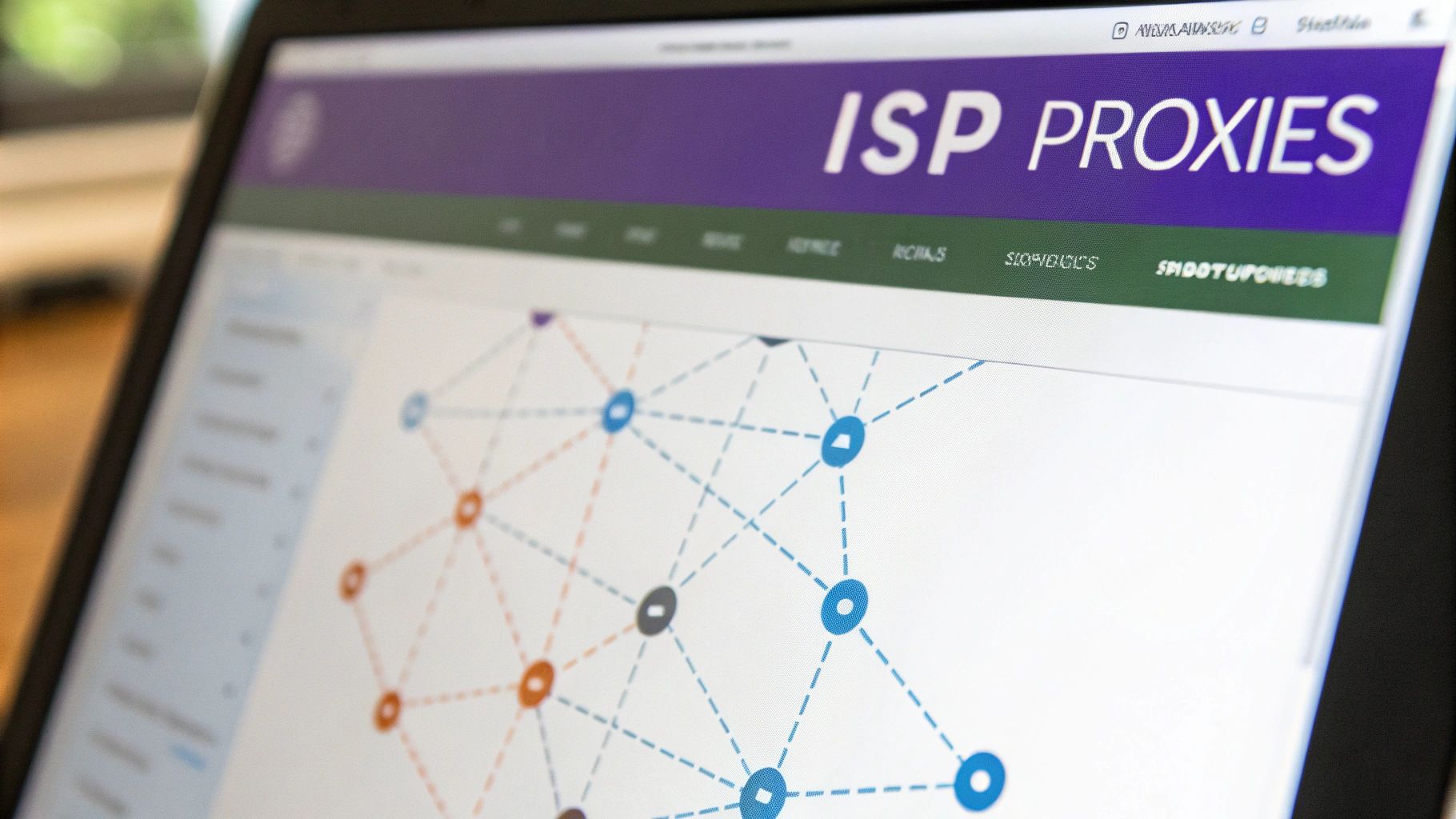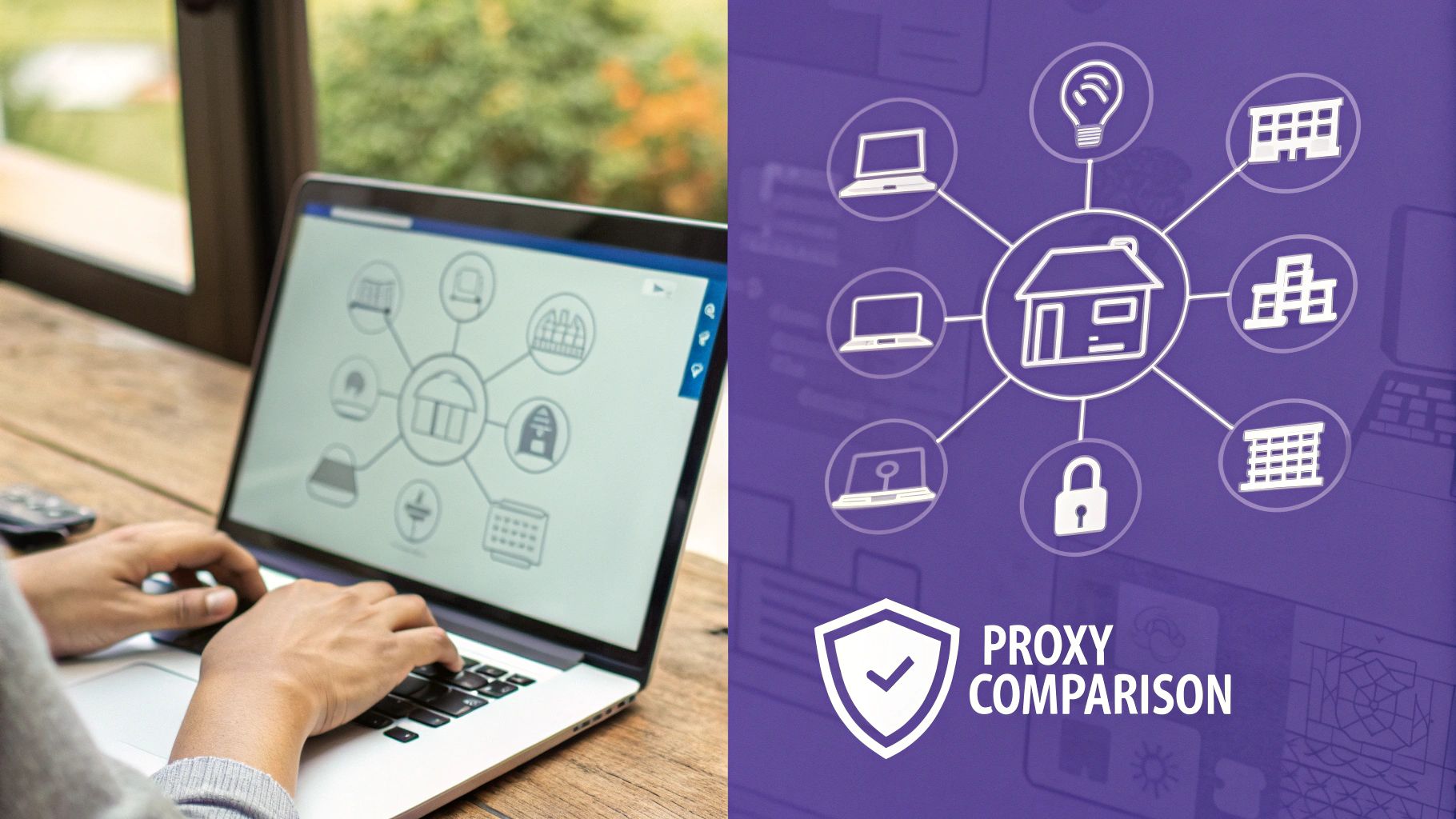When you hear "proxy," you probably think of two main types: datacenter and residential. ISP proxies throw a fascinating wrench into that dynamic, creating a powerful hybrid that combines the best parts of both.
Think of them as the special forces of the proxy world—they have the raw speed and power of a datacenter but carry the legitimate credentials of a real residential IP address. In short, they're high-performance servers that look like they're coming from a normal home connection, making them incredibly fast and almost impossible to detect.
So, What Exactly Are ISP Proxies?

Let's break this down with a quick analogy. Imagine you need a vehicle for a high-stakes, cross-country mission. You have a couple of options:
- A Datacenter Proxy: This is like a souped-up race car. It’s unbelievably fast and always ready to go, but it screams "commercial vehicle" from a mile away. Websites can easily spot it's from a commercial garage, not a residential driveway. For example, trying to access a ticket-selling website with a datacenter IP might get you blocked before you even see the event page.
- A Residential Proxy: This is like borrowing your neighbor’s minivan. It blends in perfectly with everyday traffic and never raises suspicion. The problem? It might not be very fast, and your neighbor could need it back at any moment, leaving you stranded. For instance, if you're in the middle of a complex data scrape, the connection could drop, corrupting your results.
An ISP proxy is the ultimate solution. It’s that high-performance race car—fast, stable, and built for endurance—but it’s officially registered to a legitimate home address provided by a real Internet Service Provider (ISP). You get the muscle and the perfect cover story.
The Best of Both Worlds, Solved
This hybrid approach directly tackles the biggest weaknesses of other proxy types. You get the rock-solid stability and massive bandwidth of a server housed in a professional datacenter, which is non-negotiable for any task that needs consistent, top-tier performance.
At the same time, the IP address itself is issued by a recognized ISP, just like the one powering your home Wi-Fi. To any website you visit, your connection looks like a genuine, everyday user. This drastically reduces the chance of getting flagged, blocked, or fed misleading information.
It’s this unique combination that’s fueling major growth in the proxy market. The global proxy server service market, valued at USD 2.51 billion, is on track to more than double by 2033, largely because of the growing demand for reliable and stealthy solutions like ISP proxies. You can dive deeper into these market trends and see what's driving the shift.
Key Takeaway: ISP proxies are hosted on powerful datacenter servers for maximum speed and uptime, but they use IP addresses from official Internet Service Providers. This makes them appear as authentic residential users, giving you the perfect blend of performance and credibility.
Comparing ISP, Datacenter, and Residential Proxies

To really get why ISP proxies are such a big deal, you have to see how they stack up against the old guard: datacenter and residential proxies. Each type has its place, but they both come with major trade-offs. ISP proxies were basically engineered to eliminate those compromises.
Think of it like choosing the right tool for the job. You wouldn't use a sledgehammer for a finishing nail, right?
Datacenter proxies are the sprinters of the proxy world. They live inside massive data centers with incredible infrastructure, which means you get blazing-fast speeds and rock-solid uptime. They're built for tasks that need raw, unfiltered power and speed.
But their biggest strength is also their fatal flaw. Because their IP addresses all come from commercial servers, they stick out like a sore thumb. Any halfway-decent website can spot a block of datacenter IPs from a mile away, leading to instant blocks, endless CAPTCHA puzzles, or even being fed fake data. Our guide on datacenter proxies dives deeper into this vulnerability.
The Residential Proxy Alternative
At the other end of the spectrum, you have residential proxies. These use IP addresses that belong to real home internet connections—the same kind you have. This makes them look completely organic and trustworthy to websites. For bypassing sophisticated security, their legitimacy is a superpower.
But that authenticity has a price. Since you're piggybacking on a real person's device, the connection can be flaky and slow. If the user turns off their computer or their Wi-Fi drops, your connection goes with it. That's a dealbreaker for any serious, large-scale project.
The demand for legitimate-looking IPs is huge, though. The residential proxy market was valued at around $670 million and is expected to hit $913 million by 2031. People are clearly willing to deal with some instability to get that authentic footprint.
The Hybrid Solution
This is exactly the gap ISP proxies were designed to fill. They take the best of both worlds and leave the weaknesses behind.
Key Takeaway: ISP proxies give you the 99.9% uptime and raw speed of a datacenter server but wrap it in a legitimate IP address from a real Internet Service Provider. It’s a datacenter engine with a residential disguise.
You end up with a static, incredibly fast connection that stays stable for hours or days, all while appearing as a genuine user to any website you visit. This unique combination makes them the superior choice for a ton of critical tasks.
To make the differences crystal clear, here’s a quick breakdown of how these three proxy types measure up against each other.
ISP vs Residential vs Datacenter Proxies At a Glance
This table offers a direct comparison of the three major proxy types. It's designed to help you quickly see the strengths and weaknesses of each, so you can pick the perfect tool for what you need to accomplish.
| Feature | ISP Proxies | Residential Proxies | Datacenter Proxies |
|---|---|---|---|
| Speed & Uptime | Excellent (Static, High-Bandwidth) | Variable (Depends on User's Connection) | Excellent (Server-Grade Hardware) |
| Trustworthiness | High (Looks like a real user) | Highest (Is a real user connection) | Low (Easily identified as commercial) |
| Stability | Very High (Hosted in a datacenter) | Low to Medium (Connection can drop) | Very High (Always-on servers) |
| Ban Risk | Very Low | Lowest | High |
| Typical Use Case | Social media management, e-commerce | Bypassing tough geo-blocks, ad verification | High-volume, low-security scraping |
As you can see, while residential proxies offer the lowest ban risk and datacenter proxies provide pure speed, ISP proxies deliver a balanced, high-performance profile. They give you the stability and speed you need without the high risk of getting blocked, making them a powerful and versatile option.
So, What Are the Real Benefits of Using an ISP Proxy?

Alright, enough with the technical breakdown. Let's talk about what actually matters: the real-world advantages you get from using ISP proxies. These benefits are what make them a go-to tool for anyone serious about e-commerce, marketing, or large-scale data gathering.
It's this blend of datacenter speed and ISP legitimacy that makes them so powerful. It's also why the entire global proxy server market is exploding. Valued at roughly USD 3.4 billion in 2023, the market is on track to hit USD 7.2 billion by 2031, largely because professionals need tools like ISP proxies that just work without getting blocked.
Unmatched Speed and Rock-Solid Stability
When your tasks are time-sensitive, speed is everything. ISP proxies are built on powerful datacenter servers with commercial-grade connections, giving you the same incredible speeds and 99.9% uptime you'd expect from a high-end datacenter proxy.
This means you can run huge data scraping jobs or manage a dozen accounts without ever worrying about lag or dropped connections. Think about scraping thousands of product prices during a flash sale—the stability of an ISP proxy ensures your script hums along without a single hiccup.
Key Insight: ISP proxies are static. Your IP address doesn't suddenly change mid-task. This consistency is absolutely essential for things that need a persistent session, like managing a social media account or working through a multi-step checkout process.
Vanishingly Low Ban Rates
Here’s the killer feature: an incredibly low risk of getting detected and banned. Because the IP address is officially registered to a real Internet Service Provider, websites see your connection as just another genuine, everyday user.
This legitimacy is a total game-changer. Sophisticated security systems that can spot and block entire subnets of datacenter IPs will almost always let traffic from an ISP proxy pass right through. For you, this means fewer interruptions, way less time wasted on CAPTCHAs, and a much higher success rate for your requests.
For a deeper dive into how different tools protect your identity, a good understanding of online privacy features can show you the bigger picture of digital anonymity.
Operating with Total Legitimacy
At the end of the day, ISP proxies let you operate under the radar. They're the perfect disguise, mixing the raw performance of a server with the trusted name of a real residential user. This combination unlocks access to even the most heavily fortified websites.
Let's look at how this plays out in the real world:
- Social Media Managers: You can manage dozens of client accounts from a single dashboard without triggering security flags that could get them locked.
- E-commerce Analysts: You can pull competitor pricing data 24/7, confident you're getting accurate information instead of being blocked or fed junk data.
- SEO Professionals: You can check search engine rankings from different locations, knowing you're seeing the exact same results a real user in that city would.
Powerful Use Cases for ISP Proxies

Knowing the "what" is one thing, but seeing ISP proxies in action is where their real power becomes clear. Their unique mix of speed, rock-solid stability, and legitimacy makes them the go-to tool for critical jobs where getting blocked simply isn't an option.
Let's dive into some real-world examples of how businesses are using them to gain a serious edge.
Unlocking Non-Stop Data Scraping
Imagine you're an e-commerce analyst, and your job is to track competitor prices on thousands of products every single day. If you use a datacenter proxy, you'll get spotted and blocked almost immediately. A residential proxy might work, but it could be too slow or unstable for an operation that massive.
This is the perfect scenario for an ISP proxy.
It gives your scraping tools a static, lightning-fast connection that looks just like a genuine home shopper. This allows your tools to run 24/7 without a single interruption, feeding you accurate, real-time data to sharpen your own pricing strategy. For any business that relies on competitive intelligence, this kind of dependable data scraping is a total game-changer.
Managing Multiple Accounts Without a Hitch
Think about a digital marketing agency handling social media for dozens of different clients. Logging into all those accounts from the same IP address is a huge red flag for platforms like Instagram or Facebook. It's the fastest way to trigger security alerts, get accounts locked, and deal with some very unhappy clients.
ISP proxies solve this problem elegantly. By assigning a clean, static, and legitimate IP to each account, it looks like every profile is being managed from a separate, authentic location. This lets the agency work efficiently from one place, knowing their clients' accounts are safe and sound.
Practical Insight: Assigning one unique ISP proxy per account creates a consistent digital footprint. This consistency is key to avoiding platform suspicion and ensuring long-term account health.
The same idea applies to any situation that requires multiple logins, whether you're managing several seller accounts on Amazon or handling different online advertising profiles.
Verifying Global Ad Placements and SEO
If you're running ad campaigns across the globe, you need to know for sure that your ads are showing up correctly in each region. The same goes for SEO pros who need to check search engine rankings from different cities to get an accurate read on performance.
ISP proxies are tailor-made for these kinds of verification tasks. Here’s how they're used:
- Ad Verification: A marketer can grab an ISP proxy with a German IP to see their ads exactly as a user in Berlin would, confirming everything is compliant and placed correctly.
- SEO Monitoring: An SEO specialist can switch between ISP proxies based in New York, London, and Tokyo to check local search rankings, perfectly mimicking what an organic user would see in each city.
- Website Testing: Developers can test how their site’s content, language, and performance change for users in different countries, all without ever leaving the office.
Securing High-Demand Products
In the cutthroat world of limited-edition releases—from sneakers to concert tickets—speed and reliability are everything. Retail sites are incredibly good at spotting and blocking the automated bots that use datacenter proxies.
This is where ISP proxies truly shine.
They deliver the raw speed needed to fly through a checkout in seconds, all while appearing as a legitimate shopper. Because they're static, the connection stays stable through the entire purchase, from adding an item to your cart to hitting that final confirmation button. This gives users a massive advantage in grabbing those hard-to-get items, a practice popularly known as 'sneaker copping'.
How to Choose the Right ISP Proxy Provider
Picking the right ISP proxy provider is a huge decision, one that can make or break your entire project. It's not about snagging the cheapest deal you can find; it's about partnering with a service that's genuinely reliable. To do that, you have to look past the flashy marketing and dig into what really matters, starting with the quality of their IPs.
A provider is only as good as its IP pool. The foundation of any great service is a large, diverse, and ethically sourced collection of IP addresses. Ask them straight up: how many unique subnets do you have? A high number is a great sign because it means their IPs are well-distributed, which drastically lowers the chances of one blocked IP taking down others in your pool.
Key Consideration: Always find out where their IPs come from. Trustworthy providers are completely transparent about their sourcing methods, making it clear their IPs are obtained legitimately and don't come with a history of abuse.
Evaluating Performance and Reliability
Beyond the IP pool, you need to see some hard proof of performance. Look for providers that offer a solid uptime guarantee, ideally 99.9% or higher. This is your assurance that your tasks can run around the clock without frustrating and expensive interruptions. The best providers will back this promise with a formal service-level agreement (SLA).
Connection speed and bandwidth are just as crucial. Don't just take their word for it—the only way to know for sure is to test it yourself. Ask for a trial period. Getting hands-on is the only real way to see if their network can handle your specific needs, whether you're scraping data at high speed or managing a dozen social media accounts.
Here’s a quick checklist of questions you should ask any provider you're considering:
- What is your uptime guarantee, and do you back it with an SLA?
- How diverse is your IP pool in terms of subnets and geographic locations?
- Can you walk me through how you source and vet your IPs to make sure they're clean?
- What kind of customer support can I expect (e.g., 24/7 live chat, a dedicated manager)?
- Do you offer a free trial or a money-back guarantee so I can test the service?
Understanding Pricing and Support
Finally, take a close look at how they structure their pricing and what kind of support you'll get. Some providers charge by the IP, while others bill you based on how much bandwidth you use. You'll want to pick a model that fits your workflow so you don't end up paying for resources you never touch. ISP proxies are definitely a premium product, but their rock-solid reliability often makes the investment worthwhile.
And never, ever underestimate the value of good customer support. When something inevitably goes wrong, you need help from an expert, and you need it fast. Look for providers that offer 24/7 technical support through live chat or phone. That support system can be just as important as the technology itself. While ISP proxies offer a unique mix of speed and authority, it's always smart to see how they stack up against other options; you can learn more about how residential proxies differ in our detailed guide.
Common Mistakes That'll Get Your ISP Proxies Flagged
Having a powerful tool like an ISP proxy is one thing; using it correctly is another. Even with the best IPs on the market, a few simple missteps can completely torpedo your efforts. If you want to maximize your effectiveness from day one, you need to sidestep these common pitfalls.
The most frequent technical blunder I see is people completely forgetting about their browser fingerprint. You can have a perfect, squeaky-clean IP address, but if your browser is leaking data that screams a different location or identity, you’re going to get flagged instantly. It's like wearing a perfect disguise but speaking in your own distinct voice—it gives the game away immediately.
Actionable Insight: Always use a tool or browser extension that lets you manage and spoof your browser fingerprint. This makes sure your user agent, screen resolution, and language settings all line up with your proxy’s profile, creating a consistent and believable digital identity.
Sourcing and Strategy Errors to Avoid
Another huge mistake is choosing a provider based on price alone. When you opt for the cheapest service you can find, you're often just buying from a pool of overused and potentially blacklisted IPs. If your "brand new" proxy has already been flagged for abuse on your target site, it’s useless before you even start.
Ignoring a website's terms of service is just as damaging. ISP proxies make you harder to detect, but they don't make you invisible. Aggressively scraping a site that explicitly forbids it can lead to more than just a temporary block—it could get your entire IP subnet permanently banned. This is where understanding what ISP proxies are used for ethically becomes critical.
Finally, make sure you aren't making these operational mistakes:
- Using one IP for too many tasks: Trying to run dozens of social media accounts through a single proxy is a recipe for disaster. Best practice is to dedicate one ISP proxy per account. This keeps your digital footprint clean and consistent.
- Forgetting to rotate when necessary: ISP proxies are static, but that doesn't mean you never switch them. For large-scale scraping jobs, failing to rotate IPs occasionally can still trigger rate limits and grind your project to a halt.
- Ignoring geolocation: Using a proxy from a different country than the account you're managing or the website you're targeting is a massive red flag. Always match your proxy’s location to the task at hand.
Your ISP Proxy Questions, Answered
Even after you've got the basics down, a few questions always seem to come up. Let's tackle the most common ones so you can move forward with total confidence.
Are ISP Proxies the Same as Static Residential Proxies?
Yes, for the most part, you can think of them as the same thing. The industry often uses these terms interchangeably.
Both labels describe a proxy that gives you a legitimate IP address assigned by an Internet Service Provider (like Verizon or Comcast) but hosts it on a high-speed datacenter server. This clever combination is what gives you the best of both worlds: the trusted reputation of a real residential IP and the blazing-fast performance of a datacenter connection.
Why Are ISP Proxies More Expensive?
It really boils down to the value and scarcity of the IPs themselves. Getting a batch of genuine, clean IP addresses directly from a major ISP is a far more involved and costly process for proxy providers.
You're not just paying for an IP; you're investing in performance and reliability. That premium translates directly to fewer blocks, minimal interruptions, and a much higher success rate for whatever you're trying to accomplish online.
Can I Use ISP Proxies on Any Website?
While ISP proxies have an incredibly high success rate and can fly under the radar on most sites, they aren't a magic key. You still have to play by the rules.
Always respect a website’s terms of service. If you use any type of proxy for activities that are clearly forbidden, you're still likely to get blocked, no matter how good your proxy is. Think of it as having a great disguise—it won't help if you're caught breaking the house rules.
When you need a proxy solution that brings together speed, stability, and legitimacy, IPFLY delivers. We offer premium ISP proxies built for serious projects that demand top-tier results. Explore our powerful proxy solutions today and see the difference a high-quality connection can make.


